The lure of British Columbia’s beauty and warmth is replaced by the ability to raise a family and have more disposable income in Alberta.
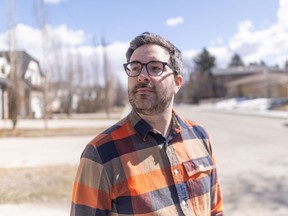
Article content
He promised his friends he would be back once he graduated high school — after all, he was a Torontonian at heart.
That was until John Cullen flew to Vancouver with his family, watching the snow-capped Rockies peeking over the clouds from his airplane window, marvelling at the turquoise lakes below.
Article content
It took only a year for then-13-year-old Cullen to realize Vancouver was where he belonged. “There’s just something about the fresh air in B.C.,” he said. “It just felt like ‘Gosh, I mean, this is, this is beautiful.’”
Advertisement 2
Article content
Cullen didn’t return to Toronto as promised. Instead, he studied at the University of B.C., pursuing a bachelor’s degree in English Literature.
Cullen blended effortlessly into the city’s melting pot. He found a home in Vancouver’s thriving arts scene, drumming for an indie rock band. Later, he began working as a high school teacher, and at age 25, he ventured into comedy, eventually becoming a professional comedian.
He thought he’d never leave Vancouver — until the shifting economic reality of the city reached his doorstep.
Cullen and his partner in 2016 settled into a two-bedroom apartment, for which they paid $1,600 a month in rent — a goldmine in a city where prices for similar spaces soar above $3,000. The amount inched by only a few per cent over seven years, thanks to rent control. Then, in 2023, he received a notice of renovation.
The couple wasn’t asked to leave, but every day, they would wake up to the sounds of workers hammering and sawing — an inconvenience they were told would last up to five years. This was especially difficult for Cullen, who sometimes taught high school students and ran a podcast from home.
Advertisement 3
Article content
In an ideal world, it shouldn’t have been a problem. But in 2023, moving to a new apartment in Vancouver could mean paying double or sometimes triple one’s previous rent — if they find a space.
A few months later, in September, the couple was in Calgary, buying a condo in Winston Heights.
Cullen is among thousands of B.C. residents flocking to Alberta.
StatCan estimates the number to be 37,650 in 2023 alone. For the first time since 2012, B.C. lost more people than it gained, and almost all of those who moved in the final quarter of 2023 flowed to Alberta — a break from a trend where people in the prairie province sought out the West Coast as a place to live after retirement.
Why do people move here?
Based on conversations with newcomers from B.C., the reasons are diverse: For many, it’s the fleeting dream of homeownership. For others, it’s the promise of economic opportunities. And for a few, it’s an escape from a rise in crime and disorder.
Such factors aren’t far from why people historically settled in Alberta.
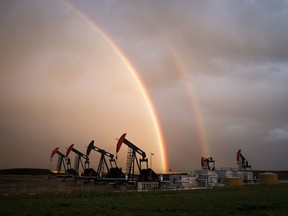
Frank Trovato, who teaches sociology at the University of Alberta, explains the main driver for migration to the province has been the price of oil. The higher the price, the stronger the economic growth, resulting in a larger influx of migrants.
Article content
Advertisement 4
Article content
Typically, interprovincial migration to Alberta has largely followed periods of prosperity. Populations rose during the boom between 1973 and 1980, the economic recovery in the mid-1990s and a spell of growth from 2000 to 2008. The inverse is also true: when the economy shrinks, people leave the province.
Alberta is currently undergoing a period of growth following a downturn ushered in by COVID-19. The price of oil (WTI) jumped $120 a barrel in 2022, dropping to the low 90s in September, and averaging at $85 as of April 3. The province has the highest employment rate of all the provinces at 65.5 per cent compared to 61.7 per cent in B.C. and 60.6 per cent in Ontario.
“Given the economic growth in Alberta, it is not surprising that Alberta is receiving significant increases in interprovincial migrants from other provinces, particularly Ontario and BC,” Trovato wrote in an emailed statement.
“Alberta’s favourable economic situation explains a large part of its recent increases in net interprovincial migratory gains.”
But unlike those simply lured by economic opportunities, new migrants are also escaping the vortex of soaring living costs in major Canadian cities.
Advertisement 5
Article content
The average price of a detached home in Vancouver is $1,943,200, while wages in the city are nowhere near what it would take to afford a house. RBC has called it a “full-blown” crisis. Another report deemed B.C. the country’s most unaffordable place for a renter to live.
In contrast, a house in Calgary sells for $567,900, with a similar property in Edmonton priced at $508,411. As the reality dawns on people, the prospect of leaving B.C. doesn’t feel daunting anymore. The lure of its beauty and warmth gives way to the chance of raising a family and having more disposable income.
Cullen had been to Calgary several times on tour for his comedy shows. He fell in love with the city’s food scene, especially with restaurants including Major Tom, Ten Foot Henry and Noble Pie. It was sunny and close to Banff. It was multicultural and not as massive as Toronto.

The politics involved
The couple felt accepted into the Calgary community. However, one challenge for Cullen has been to reconcile with Alberta’s politics. Being raised in a progressive milieu, he doesn’t agree with a few provincial policies, including those around transgender youth, although he finds comfort in the city’s young progressive population.
Advertisement 6
Article content
While conservative politics has been a compromise for some newcomers from B.C., others like Jeremy Odell were especially drawn to its promises. Odell, who’s originally from Memphis, Tennessee, moved to Campbell River, B.C., from Penticton, Ont., in 2014 after separating from his former wife.
“I kind of felt like Dorothy in The Wizard of Oz — ‘Toto, we’re not in Kansas anymore,’ ” Odell said. “I remember driving around Campbell River at 6 a.m., and I’m going along the waterfront, and I watched a couple of humpback whales jumping off the pier.”
Odell, who worked as a sales associate at a big box retailer, was also a part-time harm reduction medic at Vancouver Island Mental Health Society, reviving people from a drug overdose. As years went by, he tired of seeing more and more people succumb to their addiction.
“Do you drink?” he asked, explaining his state of mind through an analogy. “You know, you sit at the bar, and it’s the same people ordering the same drinks, wanting the same songs from the DJ, night after night after night after night. And you just get tired of it.”
One day, a man entered the store Odell worked at, ordering him to hand over money while brandishing a knife. Odell’s colleagues called 911, after which officers arrived at the store and arrested the man. The incident was the last straw for Odell.
Advertisement 7
Article content
“Campbell River is still small enough that even when that person gets out of jail, you’re still going to see him around town, so you may wind up in a situation at McDonald’s where you’re fighting for your life or your wife’s honour.”
He and his current wife, who is also a harm reduction medic, began looking for houses in Alberta, which focuses more on addiction treatment than providing a safer supply of illicit drugs. The couple saw several videos of realtors on YouTube and found Cochrane their best bet. Soon, they found a townhouse.
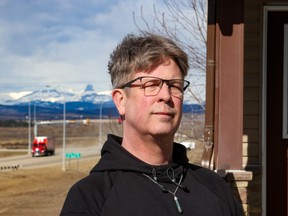
“I love being able to look out my bedroom window and see the Rocky Mountains — love all of the big-town amenities with a small-town charm,” he said.
“I have seen it in the media — there’s always going to be those people, asking new residents, ‘Well, why did you move here? You are ruining my little town.’ Well, it’s that little town vibe that people love.”
Recommended from Editorial
Advertisement 8
Article content
Do we have enough room?
Beyond changing the character of a region, many have raised questions about Alberta’s ability to accommodate newcomers. The province has been growing for 10 consecutive quarters, swelling by 202,324 residents in 2023 — roughly twice the population of Red Deer. Ontario and B.C. were the largest sources of interprovincial migration, while almost two-thirds were immigrants.
In contrast, only 35,223 housing units in 2023 were added in the province, as per data by Canada Mortgage and Housing Corp, tightening the vacancy rate in major cities, including Calgary, which is at 1.4 per cent. CMHC now predicts housing in Calgary will become scarcer and more expensive in 2025.
Vibrant Communities, a non-profit research organization, estimates lower housing availability in Calgary has pushed 115,000 people to the brink of homelessness.
Josh White, outgoing director of city and regional planning at the City of Calgary, told Postmedia the number of people who arrived in the city was double what they had anticipated. “The city is under pretty extraordinary growth pressures at present,” White said.
Advertisement 9
Article content
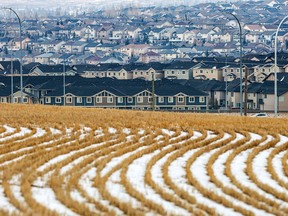
The city has three components in its strategy to address population growth: expanding existing infrastructure, opening up city lands for development and boosting job growth. Over the last five years, White said, the city has spent close to $300 million in developing new communities with services such as water and sewer infrastructure, and between $150 and $200 million in strengthening established areas by servicing their streets, transit, parks and utilities.
However, the city is limited in its approach to addressing newcomers. Broader areas, including education and health care, fall under the province’s jurisdiction, and though the 2024 provincial budget allotted spending increases in these spheres, they are below the demands of an ever-growing population, according to economist and professor at the University of Alberta Chetan Dave.
Complicating the problem of the province and major cities is the prospect of people leaving in droves when times are tough. “The risk is that you just spend a bunch of money building schools that are going to be empty,” he said.
In an emailed response, Justin Brattinga, senior press secretary for the Ministry of Treasury Board and Finance, said, “Budget 2024 had the largest capital plan in Alberta’s history at $25 billion, with a $2 billion increase over last year.
“It includes $2.4 billion to help municipalities fund infrastructure projects; with $539 million specifically for water and waste infrastructure improvement. It also invests $1.9 billion to advance 43 priority school projects, and in total 98 schools are at various stages of construction across the province. Budget 2024 also allocates $3.6 billion for health facilities.”
Alberta is Calling
Conflicting with growing pressures on service providers is Alberta’s vision to expand the province’s population to 10 million from 4.3 million by 2050. The aspiration is being manifested in part through its Alberta is Calling campaign, which offers a tax credit of $5,000 — roughly the cost of moving — to newcomers from different parts of the country.
Advertisement 10
Article content
The economic argument is that as more people move to Alberta, the province will increase its tax base and fund further expansions. Dave believes that will take time, and people need services now.
And while more people may have added to the province’s coffers, they are also likely contributing to its above-average unemployment rate, say a few economists. A reason could be that “we haven’t fully diversified our economy away from oil and gas and related activities,” Dave added.
Returning home
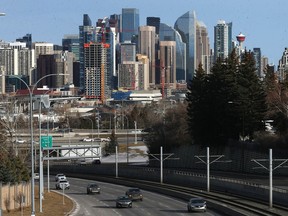
Many who shifted to B.C. are now returning to Alberta. Scott Smith grew up in Lethbridge after moving from Ontario with his family. He travelled around the world, working on several energy projects as a machinist. In 2014, he was poised to settle in Oman with a brief halt in Delta, B.C. Soon, the oil industry crashed, and he stayed in B.C. reuniting with his partner in Surrey.
Over the years, the couple moved to Prince George and then to Kelowna, where they were priced out of the housing market.
By 2022, the couple was tired of renting a house. Then, they heard talks about a new supervised injection site in town. So, they decided to pack their bags and buy a home in Brooks, Alberta. Life is more affordable now, said Smith, who works as a highway maintenance operator.
“The peace of mind we have living here — I can’t say enough about it.”
Article content






